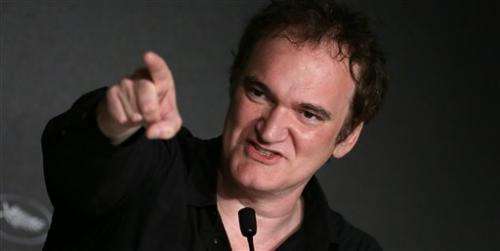Tarantino calls digital film 'death of cinema'

When Quentin Tarantino won the Palme d'Or at the Cannes Film Festival in 1994 for "Pulp Fiction," he showered his cast with high-fives, bounced to the stage where jury president Clint Eastwood awaited, and promptly answered a heckler with a middle finger.
"Pulp Fiction" arrived in brash style in Cannes 20 years ago. On Friday, Tarantino returned to the scene of the crime.
"Winning the Palme d'Or to this day has still been, as far as laurels are concerned, my single absolutely positively greatest achievement," Tarantino told reporters. "Of all the trophies that I have won, it's the one that has the biggest place of honor inside of my house. It's the one I want another one of some day before they turn out the lights."
Few films have ever sent the kind of shockwave "Pulp Fiction" did 20 years ago. While he granted its revolutionary impact influenced movies for years, he said he was merely part of "a movement in the air" to upend the safer, lighter movies of the '80s.
But Tarantino was more interested in talking about the present than the past.
"As far as I'm concerned, digital projection and DCPs is the death of cinema as I know it," said Tarantino, referring to digital cinema packages. "The fact that most films now are not presented in 35 millimeter means that the war is lost. Digital projections, that's just television in public. And apparently the whole world is OK with television in public. But what I knew as cinema is dead."
Tarantino was in Cannes to screen "Pulp Fiction" in 35mm on the beach Friday night, as well as to introduce a 50th anniversary screening of Sergio Leone's "A Fistful of Dollars," which will close the festival Saturday night. He called "A Fistful of Dollars" not only the birth of the Spaghetti Western, but "the birth of genre action cinema" for fusing its action with its prominent Ennio Morricone score.
The writer-director also commented on several projects. He said that after hosting a live-read of his script "Hatefield Eight" in April, he's reconsidering his proclamation that he would never make it following its leak online. Tarantino filed a lawsuit against Gawker Media over the leak.
"We'll see. I'm still writing the script right now," he said. "I have calmed down a bit. The knife-in-the-back wound has started to scab."
He added: "Maybe I'll shoot it. Maybe I'll publish it. Maybe I'll do it on the stage because I realized it could work very well. Maybe I'll do all three, but we'll find out."
Tarantino also said he has some 90 minutes of unused footage from his revenge Western "Django Unchained" that he's considering to combine with the released film to create a four-hour miniseries for television.
Unlike many directors, Tarantino said that he loves to re-watch his films (and does so anytime he catches them on TV) and feels sorry for filmmakers who don't get such pleasure out of their own work.
"I've always made my movies for me, anyway," said Tarantino, grinning.
© 2014 The Associated Press. All rights reserved.



















